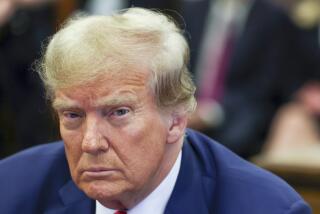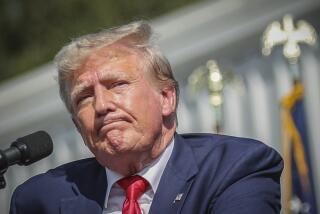Pacts With Enron May Be Loans in Disguise, Judge Says
- Share via
NEW YORK — A federal judge said Tuesday that there was evidence J.P. Morgan Chase & Co. had extended a “disguised loan” to Enron Corp., which could prevent Morgan from collecting on nearly $1 billion in surety bonds.
In a strongly worded ruling, U.S. District Judge Jed Rakoff denied J.P. Morgan’s bid for a summary judgment to force 11 insurance companies to immediately pay $965 million in bonds guaranteeing Enron oil and natural gas contracts. He set a trial on the issue for Dec. 2.
Legal experts said the judge’s opinion was noteworthy for its unusually blunt tone and because it reflected an independent judicial analysis of a Wall Street firm’s relationship with Enron.
Rakoff said the oil and gas contracts between Enron and J.P. Morgan “now appear to be nothing but a disguised loan.”
“The language is strikingly forceful,” said David Skeel, a University of Pennsylvania law professor. “This is a significant ruling.”
Congress and federal regulators are seeking to determine whether Wall Street firms such as J.P. Morgan helped Enron hide its weakening financial position from investors, in part by disguising loans as revenue-generating energy trades.
The bank has argued that the insurers must pay off on bonds issued to guarantee energy contracts between Enron and Mahonia Ltd., a J.P. Morgan-affiliated entity. The bank says the claims were triggered when Enron defaulted on its obligations after filing for bankruptcy protection Dec. 2.
The insurers have argued that Mahonia’s contracts with Enron were actually loans cloaked in the form of energy contracts, which were structured to keep large amounts of debt from showing up on Enron’s balance sheet.
The insurance companies said they never would have issued the bonds if they had known the nature of the Enron agreements.
They said that while Enron was selling gas and oil to Mahonia, it was secretly buying it from entities controlled by Mahonia. The ultimate effect, the firms claim, is that Enron borrowed money from Morgan without selling any gas and oil.
Mike Golden, a J.P. Morgan spokesman, denied that the contracts were a sham and said that the case will prove that the insurance companies must make good on the surety policies.
“The good faith of the insurance companies will be on trial,” Golden said. “Every client or counter-party to them will need to question their ability or willingness to honor plain-vanilla contracts.”
Keith Anderson, a spokesman for Travelers Property Casualty Corp. in Hartford, Conn., declined to comment other than to say the judge’s words were “sufficiently eloquent.”
It is unusual for a judge to issue such a forcefully worded opinion so early in a case, said two legal scholars who reviewed the ruling.
“With only a fraction of the evidence in, he feels comfortable stating that there was a fraudulent scheme in the form of a disguised loan,” said Gordon Klein, a corporate law expert at UCLA’s Anderson business school. “These are very strong words indeed for a judge to utter at this stage of a dispute.”
Citing evidence filed by the insurance companies, Rakoff labeled as “suspicious” the way Enron traded gas back and forth.
For example, on the same day that Enron sold gas to Mahonia, it agreed to buy identical quantities from an entity called Stoneville Aegean Ltd.
What’s more, Mahonia and Stoneville appear to be related, having been set up by the same company and sharing the same director and same shareholders, Rakoff wrote.
Mahonia paid Enron $330 million, but Enron paid Stoneville $394 million, Rakoff wrote.
The insurance companies claim that the payments were a way for J.P. Morgan to advance cash to Enron and receive back what amounted to its initial principal plus interest.
More to Read
Inside the business of entertainment
The Wide Shot brings you news, analysis and insights on everything from streaming wars to production — and what it all means for the future.
You may occasionally receive promotional content from the Los Angeles Times.










